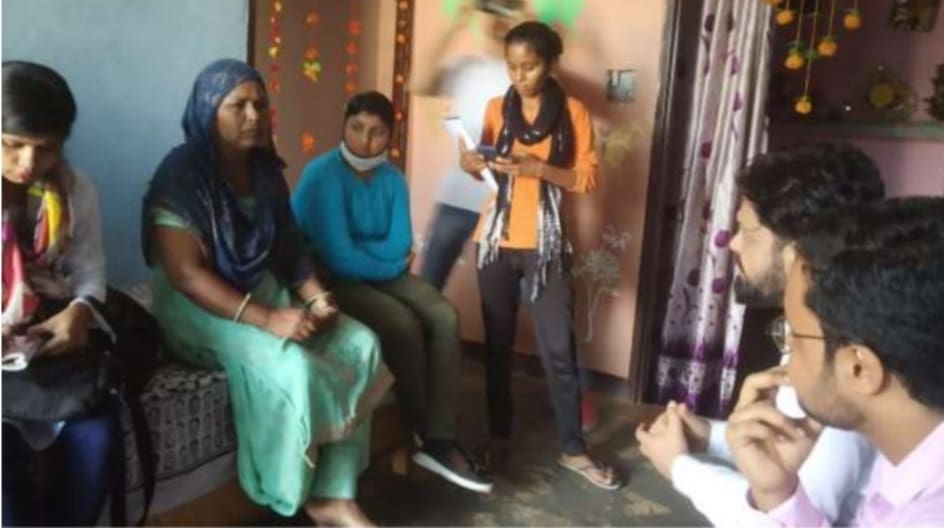
Two months back, in Haryana’s Bhoond village, Neha (19) from the Gujjar community and Akash (21) from the Dalit community married objecting her parents disapproval.
Inter-caste marriages are a rarity in Bhoond village, of Panchkula district where Dalits are a minority. Neha’s and Akash’s marriage were taken to courts.
At the district session court, Neha clarified her decision to stay with her husband and showed the bruises on her body afflicted by her family, which left her family to give up the legal battle.
Though the matter was sorted amongst parents and the judgement came in favour of the couple, they fled the village fearing the objection of former sarpanch and the upper-caste Hindu community.
While the court ruled in favour of the couple, a mahapanchayat was held by Gujjars on 17 August, and Akash’s mother, Bala Devi was called.
“Now that our honour has been lost, we will now violate the honour of the mother of the guy”, threatened the Gujjar community members during the mahapanchayat.
“I was made to stand for four hours with my hands folded during the mahapanchayat and threatened that my child would be killed if he returned to the village,” Bala Devi, the Dalit woman told a fact-finding team of the National Confederation of Human Rights Orgnisations (NCHRO).
NCHRO is a collective of human, democratic and civil rights and organisations and non governmental bodies.
Devi’s compliance and apology could not do much. The mahapanchayat went on to announce a complete social boycott on the Dalit families in Bhoond village, demanding Dalit shops in Gujjar-owned buildings emptied and any transaction with the Dalit community be fined 5000 rupees.
In a hurry, six Dalit shops were emptied and Dalit househelps in Gujjar households were also fired. Ordered not to come and work inside the village, Dalits were asked to keep themselves to houses.
When the boycott went on for a month and more, Neha’s family came apologising to the Sarpanch and the Gujjar community, and requested Dalit families be spared from the mistakes of the children. “Even elders from the Dalit community apologetically fell on the feet of Gujjars,” Sohil, a Dalit youth told NCHRO. Nevertheless, the boycott call was not withdrawn.
However, the sarpanch and upper-caste Hindus deny any social boycott against Dalits and when enquired about the firings of house helps, they excuse it to the ‘unsatisfactory work of the house help’, the fact-finding noted.
During the social boycott, Aman, a Dalit youth went to buy eggs, and a caste based argument rose asking why Aman came out of his house. “He (a member of Gujjar community) slapped me and I slapped him back. Before the fight would turn worse, I ran home,” Aman said.
Aman later found Gujjar men at his doorstep wanting to take the fight further. “I ran outside through the roof. And they left my house threatening and ill-treating my mother,” Aman told the delegation of NCHRO.
Realising the cruel extend the social boycott has gone, on 8 September, the Dalit families went on to file a case under SC/ST atrocities prevention act against the social boycott. However, the police took up no action.
After Dalits protested the police inaction, an FIR was filed with details of harassment against Aman, but nothing on social boycott was mentioned. When enquired about the omission of the social boycott, SHO said, “I am a Dalit and no such boycott has taken over here.”
Since there was no official acknowledgement of the social boycott, Dalits of Bhoond village decided to protest and demand an FIR against the social boycott, installation of a police booth at the intersection so that harassment cases similar to Aman would not repeat, the arresting of the culprits, and the granting of the 33% Panchayati land in the village that is meant for the SC community, which the upper-caste has illegally hoarded.
“They threatened us that if we protest, we would be fired. But then these are only their intimidating tactics. We are going to protest what may come,” Sohil said.
Though inter-caste marriages have earlier happened in Bhoond village, it has never escalated to the extent of social boycott. Along with the BJP backed former sarpanch and other influential Gujjar men, failure in responsible intervention from the police had worsened the situation in Bhoond village, observed NCHRO.
Unfortunately, social boycotting of Dalits in Bhoond village is not an isolated incident in Haryana.
Over 150 Dalit families in Chhatar village of Jind district, is also facing social boycott, after an upper caste was arrested following a Dalit youth, Gurmeet’s complaint of caste harrasment, during a Kabbadi match. Pressurizing to withdraw the complaint, the Jat Hindus have called for a massive social boycott against Dalit families on all essentials including milk, medicine and transport. And any dealing with Dalits would be fined 11,000 rupees.
Releasing the NCHRO fact finding report, Manisha from Chhatra Ekta Manch, contextualised the casteist harassment to inequalities faced by Dalits, who hold little to no land in the state of Haryana.



